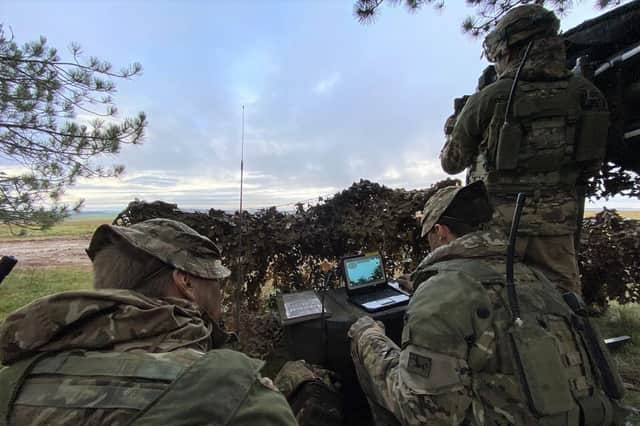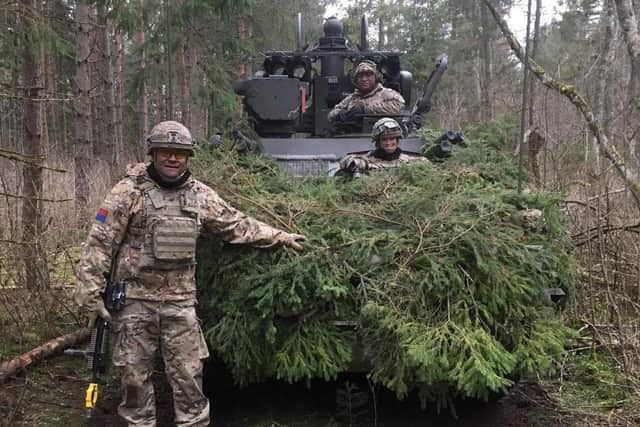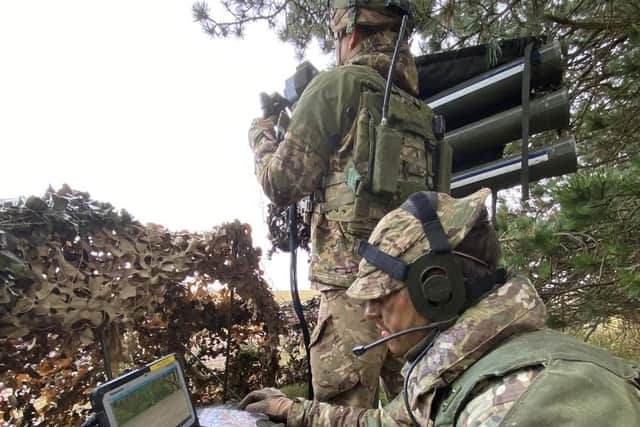Army chief vows to lead the charge in tackling deadly rise of swarm drone attacks head on


Panicked shouts erupt as a kamikaze drone, just 6th in length but packed with enough high explosives to level a small building, streaks down towards a bus full of soldiers.
With deadly accuracy, the unmanned vehicle punches through the coach and explodes, ripping it apart in an instant and obliterating everything inside.
Advertisement
Hide AdAdvertisement
Hide AdRecorded only last month, the attack is one out of many drone strikes used by the Azerbaijan military to inflict crippling blows on the woefully ill-prepared Armenians during the month-long clash between the two forces earlier this year.


And it serves as a deadly lesson to other nations of the lethal effectiveness relatively cheap drones can have on the 21st century battlefield – a lesson that Lieutenant Colonel David Butt is all too keenly aware of.
The 41-year-old soldier is the new commanding officer of 12 Regiment, Royal Artillery, one of the British Army’s specialist air defence units.
Operating from the regiment’s base on Thorney Island, it is his job to modernise the group and prepare it to defend against such attacks.


Advertisement
Hide AdAdvertisement
Hide Ad‘The character of conflict has fundamentally changed not just in the last 15 years but in the last five years,’ he says.
‘The cheapness of some of these assets and how they’re readily available from PC World – you don’t want to be firing off a £40,000 missile to take a £100 drone down.
‘It is beholden upon us, and the close air-defence unit for the British Army, to understand how we can meet that threat and deny it in the battlefield.’
Swarm drone ‘threat’


High on the list of concerns is the deployment of large drone ‘swarms’, which could overwhelm current air defence strategies and inflict huge amounts of damage for a fraction of the cost of a traditional airstrike.
Advertisement
Hide AdAdvertisement
Hide AdThe strategy is still in its infancy. But it is something that Russian forces have already come face to face with.
Last year a swarm of 13 drones was launched against Russia’s Khmeimim airbase and nearby naval facility in western Syria in a single assault.
The Russians dealt with the explosive-armed aircraft, either shooting them down or jamming them. But the failed attack was a disturbing close-call.
Portsmouth soldiers are already dealing with the consequences of a swarm drone attack, with troops from 16 Regiment, Royal Artillery – also based at Thorney Island – now deployed in Saudi Arabia to defend oil fields from assault, following a successful raid that crippled a dozen refinery sites last year.
Advertisement
Hide AdAdvertisement
Hide AdLt Col Butt said he was determined to revolutionise 12 Regiment to meet the ‘conundrum’ of these future threats head-on.
Grenade-dropping quadcopters
It’s a threat taken seriously by Britain's closest ally, American, who has recently pumped £1bn in new kit to tackle drones after coming under aerial bombardment for the first time in 65 years.
US troops faced waves of grenade-dropping quadcopter drone attacks from Islamic State during the fight to retake Mosul.
‘If I were to describe the ambition that I have for my tenure here with a single word it would be “experimentation”,’ Lt Col Butt adds.
Advertisement
Hide AdAdvertisement
Hide Ad‘Commander Field Army is absolutely clear that we have got to use this opportunity now to sail fast and find out what works.
‘That’s a really helpful mentality to instil in us because swarm drones are a really tricky issue.’
The unit already has a hi-tech arsenal of weaponry and technology at its disposal, from high-velocity missiles to blast incoming threats, to sophisticated tracking arrays and sensors to warn troops of impending attack.
Experimenting with new tech
But as well as experimenting with new technology, it is also Lt Col Butt’s job to work out with his team new tactics to combat drones – while also dealing with more conventional threats like attack helicopters and jets.
Advertisement
Hide AdAdvertisement
Hide Ad‘This is a regiment that was born out of the Cold War. It was built to fight Russian Hind helicopters - that is still the case,’ says the father-of-two.
‘We are on the battlefield to poke the eyes of the enemy out, with the new lightweight multi-role missile.
‘Now we have got the new model, lightweight multi-role missile, which will certainly help kill close-knit swarms that are operating close together.
‘But also we have got to think about how that is deployed into the battlefield. The team over the next few years will be doing a lot of thinking and experimentation about how we best place ourselves and what equipment or capability is best placed across the battlefield in order to get after those swarm drones.’
A message from the Editor, Mark Waldron
The News is more reliant than ever on you taking out a digital subscription to support our journalism.
You can subscribe here for unlimited access to Portsmouth news online - as well as our new Puzzles section.
Comment Guidelines
National World encourages reader discussion on our stories. User feedback, insights and back-and-forth exchanges add a rich layer of context to reporting. Please review our Community Guidelines before commenting.
